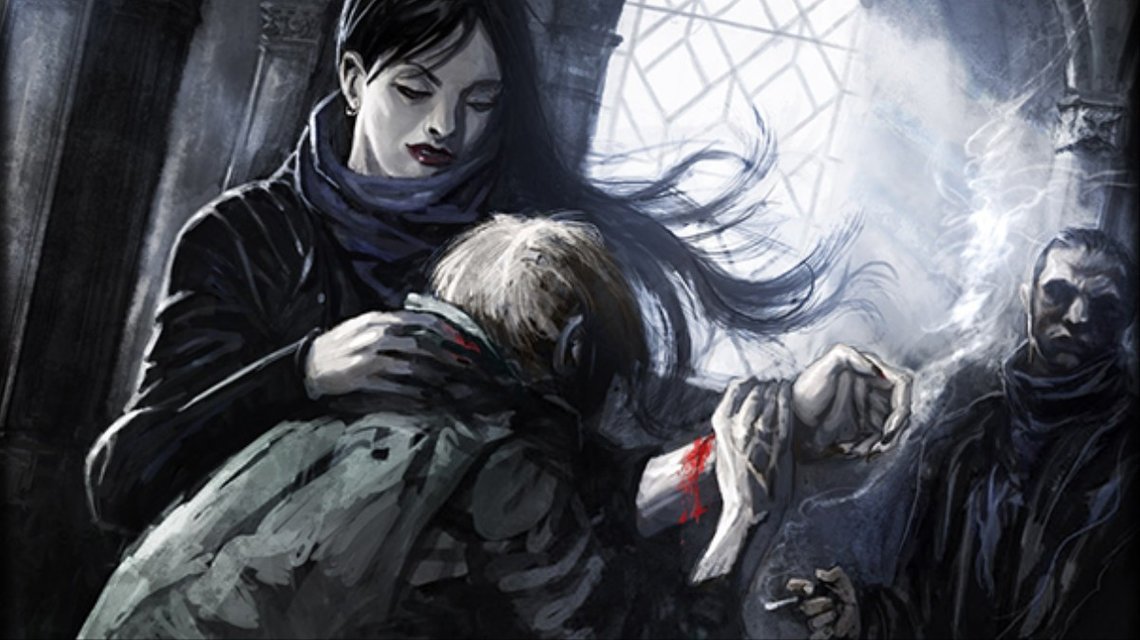When tabletop role-playing game developer Evil Hat Productions announced it had included a content warning on page six of its upcoming Fate of Cthulhu game. Many folks praised Evil Hat, but there was also the now predictable tide of hateful bullshit.
Fate of Cthulhu is an upcoming RPG where players take on the role of time travelers trying to stop a Cthulhu-style apocalypse. It’s inspired by the works of H.P. Lovecraft, who was racist and anti-semitic—vehemently racist and anti-semitic. Because of that, Evil Hat Productions is publishing a content warning on page six of Fate of Cthulhu that calls out the author, and highlights the work of writers of color who’ve reexamined and reinterpreted the author’s work.
Racism and fear of the unknown powered Lovecraft’s work. It’s not a bug, it’s a feature. Yet his work is still compelling to many, including myself. The weirder the world gets, the more popular his work becomes. “We can acknowledge the fear behind his imagination while also re-examining what came out of it,” Evil Hat Production said in its content warning.
The responses were predictable. Thousands of people replied to the tweet. Some praised Evil Hat’s decision, while others logged on to defend Lovecraft from criticism and heap scorn on Evil Hat for daring to point out that a racist was racist. “Since the predictable edgelords and apologists have now shown up," Evil Hat said in response, "a quick reminder: If you don't like the politics included in our games, don't buy them. We literally do not want your money. We are committed to diverse and inclusive gaming. We're not perfect, but we're trying.”
Tabletop RPGs are intimate experiences. Players and game masters collaborate to tell a story. Some of those stories can include themes of violence, sex, and any number of horrors both supernatural and banal. Increasingly, game designers are including guides and content warnings to help players navigate these themes responsibility. When they do, a vocal contingent online pushes against it. But players and designers say the content warnings and mature playing guides are working as intended—gatekeeping bad elements of the community and providing a framework for sensitive players to deal with mature narratives in a safe environment.
Evil Hat Productions recently told me they felt it was important to create distance between themselves and Lovecraft. “Evil Hat is committed to creating games that are welcoming and inclusive, and so we had an obligation to separate the art from the artist,” the company said over email. “No one needs to implicitly endorse the bigoted views of HPL [H.P. Lovecraft] just because they find value in the seeds of cosmic horror he planted.”
(For this story, Evil Hat's answers were written collectively by several members of the team. So while we're attributing the quotes to "Evil Hat," know they reflect the views of many actual people who work there.)
Just as important was Fate of Cthulhu’s mature content warning, which encourages gamemasters to communicate with their players about the hard edges of the game and seek their “enthusiastic consent.”
“We think it’s always worth giving both players and game masters a heads-up so they can judge for themselves whether this is the type of content they want to explore,” the company said. “No one wants their session to suddenly go sour because the game unexpectedly slips into anxiety-inducing material.”
Not all tabletop RPGs carry the same emotional weight, and there’s a big difference between running a group of friends through Storm King’s Thunder in Dungeons & Dragons and running through an apocalyptic horror game like Fate of Cthulhu. Games like Fate of Cthulhu, Vampire: The Masquerade, and Numenera are edgier than their high fantasy counterparts, and that’s part of the appeal. The mature themes are built in, and aren’t always used empathetically by players and storytellers. Consent warnings are coming into vogue in these games and are long overdue, given the mature themes and tendency to push players into uncomfortable places.
"If you don't like the politics included in our games, don't buy them. We literally do not want your money. We are committed to diverse and inclusive gaming. We're not perfect, but we're trying."
It’s possible to play in uncomfortable places safely. Vampire: The Masquerade’s 5th edition release made headlines when publisher White Wolf was accused of anit-semitism, promoting pedophilia, and marketing to neo-Nazis. White Wolf’s response was clear and fast—it modified language in its game, apologized profusely, and included an appendix titled “Advice for Considerate Play,” which detailed how to handle violence, fascism, and sexual trauma sensitively in a tabletop RPG. Then, White Wolf quickly destroyed the good will it had built up among its fans when it used Chechnya’s LGBTQ community as a prop in a section of a Vampire book. White Wolf apologized, again, and Paradox Interactive—its parent company—reined it in.
Despite the controversies, White Wolf’s content warnings are still good. They’re empathetic and clear about potential abuse between players. “ Vampire: The Masquerade is not a fascist-friendly game,” the appendix says. “If you are neo-Nazi friendly, ‘alt-righter,’ or whatever you’re calling yourself nowadays, we urge you to put this book down and call someone who you trust to talk about where you went wrong in your life.”
The Masquerade’s 5th edition has been out for more than a year, but people are still discovering the game. The recent announcement of Vampire: The Masquerade Bloodlines 2—a sequel to a cult favorite based on the tabletop—has driven more people to the game. As more players discover the book and the content warning within, they take to the internet to complain about it.

“What the hell is going on at Whitewolf?” read a post on the Bloodlines subreddit this past January. “Is there any reason behind this meltdown?” The user posted a screenshot of the first page of “Advice for Considerate Play” to his post. It’s not unique for people to complain about content warnings online, but it’s rare for the authors of the content warnings to push back against them.
That’s what Jacqueline Bryk—a freelance writer, game designer, and the author of Vampire’s “Advice for Considerate Play”—did. “Hi. I wrote this," she said on Reddit, "and I am absolutely giddy that it's doing what it's intended to do."
Bryk then proceeded to argue with her critics on Reddit until a moderator locked the thread a day later.
According to Bryk, this isn’t the first time she’s defended her work and doesn’t think it’ll be the last. “They rediscover it every so often and raise a stink about it,” she told me in a Facebook DM. “Maybe they're just late to the book, maybe it's Bloodlines, maybe it's because they've been rolling in the hatred and needed to vent it. But it's always the same: some dude finds a safety text and yells about it being a ‘hysterical meltdown’ or ‘not real gaming’ or whatever.”
Bryk said she feels it’s important to fight these battles when they come up, even if they’re exhausting and repetitive. “I consider myself an anti-fascist, and I like getting my metaphorical milkshakes to the face in where I can,” she said.
The negative reaction to content warnings always take the same shape. The aggrieved point a finger and claim the writers are having an emotional overreaction, then demand a return to an era where everyone stoically dealt with their trauma and ignored it when a piece of art evoked uncomfortable feelings. This contempt for the weak and machismo are both signs of fascism. A good content warning can filter out the bastards.
She said the response to her work has been more positive than negative, and that it’s important to keep giving players guides to help them navigate potentially traumatic waters in gaming.
“Sometimes a game will touch on something that may affect your players, because it (or something like it) happened to your players IRL [in real life],” she said. “Rape is probably the most obvious example of this, but gaslighting, torture, and animal death are others. And playing with those can be hard!”
The content warnings aren’t there to stop people from playing tabletop games that touch on those themes, they’re meant to give people a framework for including them responsibly. The process is similar to how a well-run BDSM community treats consent. There’s lots of communication and before, after, and during sessions and checklists that help players and partners find create a list of their dos, don’ts, and maybes. A BDSM scenster’s checklist helps consenting adults understand limits before they start fucking. An RPG players checklist does much the same.
According to Evil Hat, setting boundaries early leads to better games. “There’s no way to know every player’s past and there’s no reason anyone should be obligated to disclose their entire personal history before a game gets underway," the company told me. "So instead, a content warning and the use of Safety Tools (like the X card, Script Change, or Lines & Veils) creates an atmosphere of trust and respect. You’re setting the boundaries: ‘Hey, we’re all here to have fun—but if the game suddenly crosses a line and stops being fun, let’s pause or redirect that so we can get back on track and make sure it’s enjoyable for the whole table.’”

For example, in a recent game, Evil Hat was running Fate of Cthulhu at a local game store. They skipped over the Safety Tools and content discussion and jumped into play. One of the players was an Iraq war veteran.
“We were in the midst of combat and the GM described someone’s jaw getting broken," the company said. "And the vet stopped the game and said ‘Hey, you know, I’m cool with most things but I just… I have a thing about teeth.’ Clearly having anxiety about it. Now that’s not on the list of most people’s triggers, but if we’d had a better content discussion ...or had Safety Tools available, then it would have been a much smoother experience for him as well as everyone else in the game.”
“Basically, treating people's real-life issues carelessly can fuck them up more,” Bryk said. “Treating them with care and full informed consent is like ... well ... like if you're going to top someone, and you don't know their limits, right? You need to ask, and make it clear what you want to do, and come to a consensus about what will be good for both of you. Consent isn’t just for sex.”
Bryk said she’ll keep fighting fascists online as she sees them, and she’ll keep writing content warnings and guides for players. “It makes people feel safe, while also making it clear that people who engage with the material in bad faith are not welcome,” she said.
Evil Hat wants to see content warnings become the norm. “Hopefully it’s less of a trend and more of a standard practice that’s beginning to emerge. RPGs are enjoying an unprecedented renaissance and that’s bringing in a new and diverse audience,” it said. “It’s both incorrect and irresponsible to assume that everyone playing is a 28 year-old white guy from Wisconsin. From our point of view, to be truly committed to welcoming new players to the hobby, including content notices like this and encouraging the use of Safety Tools in play is one step in putting our money where our mouth is.”
from VICE https://ift.tt/2S89GJQ
via cheap web hosting
No comments:
Post a Comment